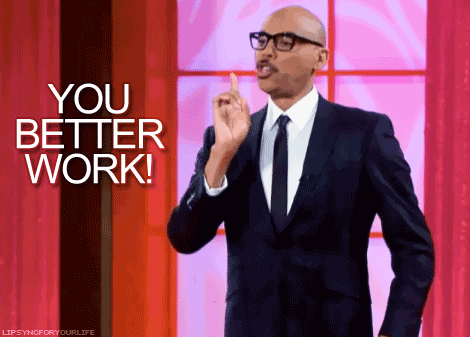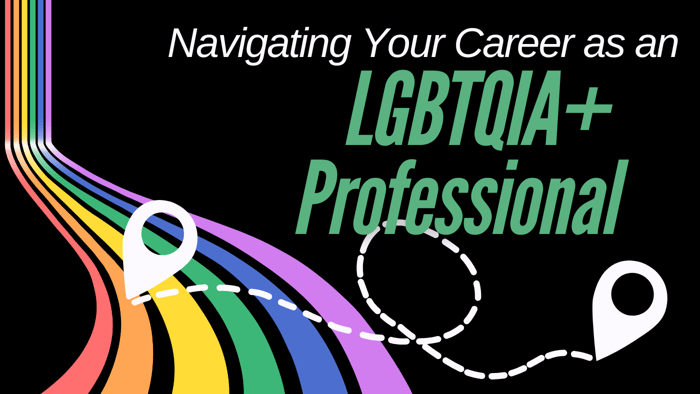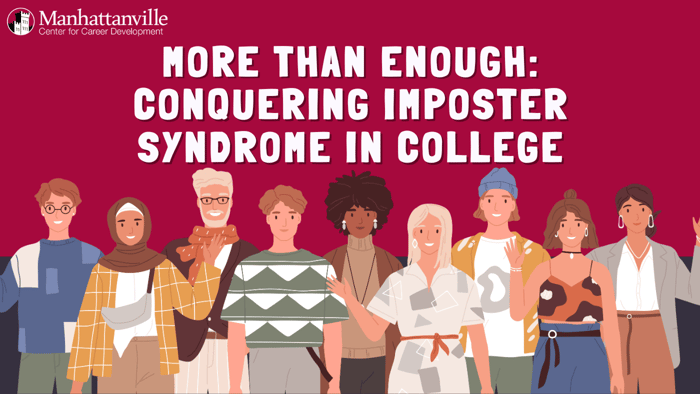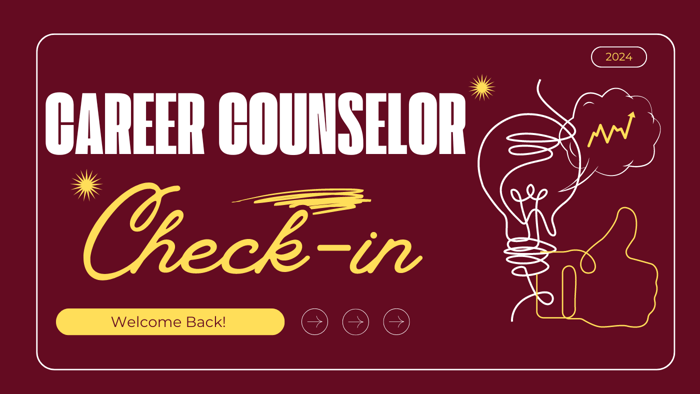Navigating Your Career as an LGBTQIA+ Professional
Throughout this blog, the word "queer" may be used as an overarching term for LGBTQIA+ individuals. This term has been reclaimed by many in the community as a symbol of empowerment and inclusivity, though I acknowledge it may not resonate with everyone. The topics discussed draw inspiration from previous Out in the Workplace panels held with Manhattanville alumni, offering insights from diverse professional experiences. This blog has been carefully curated by a queer member of the Center for Career Development to provide guidance and resources with authenticity and through lived experience.
Stepping into the professional world as a member of the LGBTQIA+ community brings a mix of excitement, challenges, and opportunities. You might be wondering how to approach coming out at work, how to recognize inclusive environments, or what self-care looks like in a professional setting. This blog explores these topics and provides actionable resources to help you navigate the workforce authentically and confidently. I also invite allies and non-members of the Queer Community to engage with this content to deepen their understanding, foster inclusivity, and build stronger connections with LGBTQIA+ colleagues and friends.
Finding Your Place in the Workforce

Starting your career is about more than securing a paycheck (although I do know that is a major factor). I hope you can view it as a process of finding a workplace where you can bring your full self, including your professional skills, values, perspectives, and identity. For some, this means exploring environments where diversity is celebrated, while for others, it might mean focusing on roles that align with their personality type. For example, extroverts may thrive in collaborative environments with frequent social interaction, while introverts may prefer roles that allow for independent work and focus. Workplace values and work-life balance are other important factors to weigh. Consider whether a company’s mission aligns with your own values, whether they actively support employee well-being, whether the work being done connects to a personal mission, and whether their policies create space for a fulfilling life outside of work.
Being queer can add an additional dimension to this process. It might shape what you look for in a workplace, such as inclusive policies and benefits, visible support for LGBTQIA+ employees, or simply an environment where you feel safe and valued. At the same time, your identity may also give you a unique perspective, helping you approach challenges with creativity, adaptability, and empathy. These qualities are highly valued in any workplace.
Steps to Begin Your Exploration:
- Reflect on what makes a workplace feel right for you. Think about the kind of environment where you work best, the values you want your employer to reflect, and the balance you need between work and personal time.
- Use resources like Pro Gay Jobs, Out Professionals, or the Corporate Equality Index to identify inclusive employers.
- Explore opportunities to connect with others who share your experiences. Networking platforms and organizations like Pride at Work or Out for Undergrad can help you learn more about workplaces where you might thrive.
Remember, your first step into the workforce is just the beginning. It is a chance to learn about yourself and what you need to succeed, both professionally and personally, and learn to adapt as time moves forward and you continue to learn and grow.
Coming Out at Work
Deciding whether to come out at work is a deeply personal choice. For some, being open about their identity feels empowering and natural, while others may prefer to keep it private, especially in environments where they are unsure about inclusivity. There is no right or wrong way to approach coming out, and your decision may evolve as you gain experience in your workplace.
What to Look For in a Supportive Environment:
- Visible Inclusivity: Workplaces that actively demonstrate support for LGBTQIA+ employees often have Employee Resource Groups (ERGs), celebrate Pride events, or are featured on tools like the Corporate Equality Index. These are great signs of an inclusive culture.
- Supportive Colleagues: Pay attention to coworkers or supervisors who use affirming language, share pronouns, or openly discuss LGBTQIA+ topics in a respectful way. These small cues can help you gauge whether the workplace feels safe and welcoming.
- Clear Policies: Look for anti-discrimination policies that explicitly include sexual orientation and gender identity. These policies show that the organization has institutional protections in place for LGBTQIA+ employees.
Strategies to Approach Coming Out:
- Selective Disclosure: Coming out to trusted colleagues or in specific settings can allow you to balance your privacy with authenticity. You can choose who to share with and when, based on your comfort level.
- Observe First: Take time to understand how LGBTQIA+ topics are discussed and whether others feel comfortable being open about their identities. If there are ERGs, such as those highlighted by Out & Equal, consider attending events or engaging with their members.
- Connect with Resources: Organizations like HRC and Out Professionals provide valuable guides and tools to help you navigate these conversations at work.
What to Do If You Are Outed Without Your Consent:
- Address It If Safe: If the situation allows, have a private conversation with the person who outed you to explain the impact of their actions and set boundaries for the future.
- Seek Support: Reach out to HR, a trusted ally, or an Employee Resource Group if your workplace has one. These resources can help you feel supported and regain control of your narrative.
- Find External Networks: Connecting with LGBTQIA+ professionals outside your workplace can provide additional advice and community support.
As many of you have experienced, coming out is not a one-time decision but an ongoing process that you can navigate at your own pace. Whether you choose to come out or keep your identity private, the most important thing is to do what feels right for you and your circumstances.
Understanding Workplace Benefits for LGBTQIA+ Employees
Benefits play a significant role in determining whether a workplace supports its employees, and for LGBTQIA+ individuals, they can have a profound impact on personal and financial well-being. Inclusive benefits show that a company values its diverse workforce and is willing to back that commitment with tangible support.
Key Inclusive Benefits to Look For:
- Partner and Family Coverage: Ensure the company’s health insurance explicitly includes same-sex partners and provides coverage for families of all structures. Adoption assistance, fertility treatments, and surrogacy support are also signs of an inclusive benefits package.
- Gender-Affirming Care: Look for coverage that includes hormone replacement therapy (HRT), gender-affirming surgeries, and mental health services. Inclusive employers often highlight these benefits on their careers page or in their benefits handbook.
- Parental Leave Policies: Companies with gender-neutral parental leave policies demonstrate awareness of diverse family needs and a commitment to equity.
Resources for Researching Benefits:
- The Corporate Equality Index scores companies on their policies, including benefits like partner coverage and gender-affirming care. Similarly, InHerSight allows you to explore how companies perform on metrics like diversity, inclusion, and work-life balance based on anonymous employee reviews.
How to Evaluate Benefits Before You Join:
- Review the Benefits Handbook: Many companies outline their benefits on their website or provide a handbook during the hiring process. If the information is not readily available, consider asking HR directly.
- Ask the Right Questions: During interviews, you can phrase your inquiry as, “Can you tell me more about the inclusive benefits your company offers for LGBTQIA+ employees?” This approach keeps the conversation professional and focused.
- Connect with Current Employees: Exploring platforms like Glassdoor and InHerSight or attending info sessions and networking events can help you hear directly from employees about their experiences.
Examples of Inclusive Employers:
- Companies like Salesforce , Google, and Wells Fargo, have been recognized for offering benefits that include gender-affirming care, adoption assistance, and coverage for same-sex partners.
Building a Support Network: Mentors and Allies

Creating a network of supportive mentors and allies can significantly impact your career growth and overall workplace experience. These relationships provide guidance, advocacy, and a sense of belonging, which can be especially valuable for LGBTQIA+ professionals navigating their careers. A lot of us are not strangers to the "chosen family" mindset.
The Value of Mentors and Allies:
- Mentors: A mentor can offer career advice, share personal experiences, and help you develop skills. For queer employees, a mentor who shares your identity can also provide insight into navigating workplace challenges.
- Allies: Allies in the workplace can advocate for inclusivity and help amplify your voice. These can include colleagues, supervisors, or members of Employee Resource Groups who actively support LGBTQIA+ initiatives.
Where to Find Mentors and Allies:
- Professional Organizations: Groups like myGwork host conferences and events to connect LGBTQIA+ students with professionals in various industries. Organizations like National Center for Lesbian Rights or GLSEN that offer advocacy and mentorship opportunities.
- LinkedIn Networking: Use LinkedIn to search for professionals in your field who openly share their LGBTQIA+ identity. Check for groups like Queer Businesses and Professionals or LGBTQ+ Advertising, Media & Marketing
How to Approach Mentors and Allies:
- Be Specific About Your Goals: When reaching out, clearly articulate why you admire their work and what guidance you're seeking. For example, "I'm impressed by your leadership in [industry] and would appreciate your advice on navigating career growth as an LGBTQIA+ professional."
- Engage Authentically: Building genuine relationships involves active listening, sharing your experiences, and showing sincere interest in their insights. You can use our tip sheet for Informational Interviews if you feel you are getting stuck with questions to ask.
- Maintain the Connection: Follow up after initial meetings to express gratitude and keep the relationship active, whether through periodic check-ins or sharing relevant updates.
LGBTQIA+ Identity as a Strength in the Workplace
Your LGBTQIA+ identity is not just something to navigate around in the workforce. It is a unique strength that can enrich your professional journey. Many employers today are starting to understand the value of diversity and actively seek out employees who bring a variety of perspectives to the table. While I am not trying to overgeneralize, there are certain qualities and skills that queer individuals often develop through lived experiences, which can translate into professional strengths.
For instance, navigating societal challenges and unique life experiences can foster creativity and innovation. Many queer individuals develop strong problem-solving skills, finding ways to think outside the box and adapt to unexpected situations. These traits are particularly valuable in fields that benefit from innovation. Empathy and communication are also common strengths. Think about ways you have utilized your emotional intelligence through building connections and navigating diverse social contexts. These skills enhance teamwork, improve client relations, and help foster inclusive workplace environments and are crucial assets in collaborative roles.
Reflecting on your own strengths is an important step in showcasing them in the workplace, no matter if they are LGBTQIA+ related or not. Ask yourself: What challenges have I faced, and how have they shaped my skills? How have my experiences helped me approach problems differently or connect with others on a deeper level? These reflections can help you articulate your value to employers during interviews, on your resume, or in conversations with colleagues.
You can also find inspiration and support by connecting with professional communities that celebrate LGBTQIA+ identities and their contributions. Attending events and conferences hosted by organizations like the National LGBT Chamber of Commerce or niche groups like Lesbians Who Tech can help you meet like-minded professionals, gain insights into leveraging your strengths, and expand your network. These spaces not only offer professional development but also remind you of the perspective, creativity, and leadership that the community brings to their industries.
Intersectionality in the Workplace

Identity is layered and multifaceted. Overlapping aspects like race, gender, disability, or religion shape how you experience the workplace and how others perceive you. These intersections aren’t just personal; they are key to understanding how systems of privilege and discrimination operate. By valuing intersectionality, you can help foster spaces where everyone feels seen and supported.
Intersectionality isn’t only about your individual experiences; it’s about how workplaces can create environments that recognize and value these overlapping identities. For example, a queer person of color or someone who is transgender and disabled may face discrimination that isn’t just additive but amplified by the way these identities interact. In further blogs, I intend on going into more detail about intersectionality in collaboration with the Center for Inclusion. In the meantime, here are some steps you can take to begin to address and embrace intersectionality in your career:
Join Intersectional Communities:
- Finding a community where your experiences are understood and valued can make all the difference. Organizations like the Audre Lorde Project provide support and advocacy for LGBTQIA+ people of color
Advocate for Broader Inclusion:
- Push for workplace initiatives that go beyond surface-level diversity efforts. Whether it’s proposing training on intersectionality, supporting mentorship programs, or advocating for inclusive hiring practices, you can help ensure that workplace equity reflects the complexity of real life.
Tips for Allies
For allies, building a supportive and inclusive workplace requires more than passive acceptance. It means taking active steps to understand and amplify LGBTQIA+ voices.
How to Be an Effective Ally:
Educate Yourself:
Learn about LGBTQIA+ history, challenges, and advocacy. Resources like the GLAAD Media Reference Guide and the National LGBTQ Task Force can provide foundational knowledge.Speak Up:
If you witness microaggressions or discriminatory behavior, address it. Your voice as an ally can create a safer and more supportive environment.Be Intentional in Language:
Use inclusive language, respect pronouns, and avoid making assumptions about someone’s identity. Small actions like these build trust and demonstrate respect.
Taking Action in the Workplace:
- Advocate for the creation or expansion of LGBTQIA+ inclusive policies.
- Support Employee Resource Groups or diversity initiatives by attending events or amplifying their messages.
- Engage with LGBTQIA+ colleagues by asking how you can best support them, rather than making assumptions about their needs.
Resources for Allies:
Support Systems at Manhattanville University
Navigating your career journey can feel overwhelming at times, but you don’t have to face it alone. Our campus offers a range of resources to support you both personally and professionally as you prepare for life after graduation. These groups are here to provide guidance, foster community, and help you thrive.
On-Campus Resources Available to You:
Student Health and Counseling (SHAC): SHAC provides mental health support tailored to your needs, including counseling services that can help you process personal or professional challenges. Whether it’s navigating workplace concerns, identity questions, or general stress, this is a confidential space to seek help.
Center for Inclusion (CFI): The CFI is a welcoming and affirming space where you can connect with peers, access identity-based resources, and participate in programs designed to build community and celebrate diversity.
Pride Club: A student-led organization focused on creating a safe space for all individuals, regardless of sexual orientation or gender identity. The club hosts meetings to discuss LGBTQIA+ issues and organizes events to promote inclusivity on campus.
Mville's Library LGBTQIA+ Resource Guide: Manhattanville's library offers an LGBTQIA+ Resources Guide, providing access to books, articles, films, and other materials focused on LGBTQIA+ topics. This guide is an excellent tool for exploring identity, learning about queer history and culture, or finding resources to support your career journey.
Center for Career Development (CCD): The CCD can guide you in identifying inclusive workplaces, exploring your career options, and building professional skills. Whether it’s reviewing your resume, preparing for interviews, or discussing workplace concerns, the team is here to help you succeed.
External Support Systems for Additional Assistance:
Sometimes you may need help beyond what campus resources can provide. Here are some organizations offering support, advocacy, and crisis intervention:
The Trevor Project: Provides crisis intervention and mental health support specifically for LGBTQIA+ individuals. Their 24/7 hotline and chat services offer immediate assistance for those in need.
A4TE or Advocates for Trans Equality: Offers resources and advocacy for transgender and nonbinary individuals, including information on workplace rights and mental health support.
GLSEN (Gay, Lesbian, & Straight Education Network): Provides resources for young adults transitioning into the workplace and offers opportunities to connect with mentors and allies.
Why Support Systems Matter:
Having a reliable network of support is vital as you transition into the professional world. Whether it’s a trusted counselor, a campus advisor, or a peer in your community, these connections can help you navigate challenges, celebrate wins, and feel empowered to bring your whole self to the workplace.
Whether you’re stepping into your first job or navigating a career change, your unique identity is a source of strength. By embracing your perspective, connecting with resources, and advocating for inclusivity, you can create a fulfilling professional journey while helping to build a more inclusive workplace for all.




